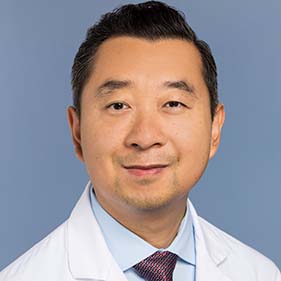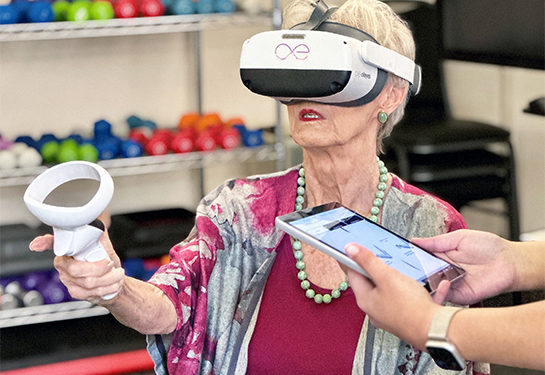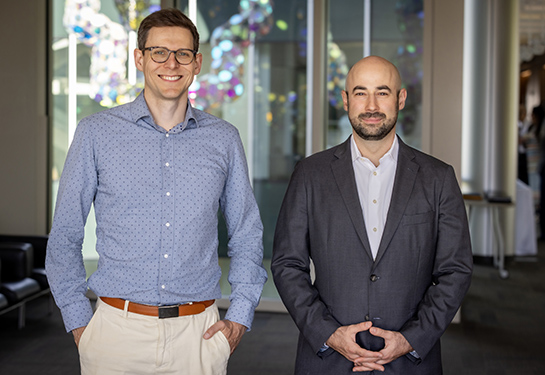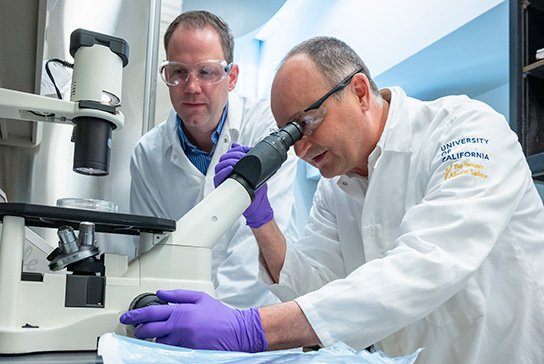New AI technology helps physicians quickly identify stroke
Platform also allows care coordination between UC Davis Health and other hospitals for stroke patients
UC Davis Health has adopted a new technology platform, Viz.ai, to help quickly identify patients suspected of having a stroke.
The hospital is the first in the Sacramento region to use the platform. It utilizes image-based artificial intelligence (AI) to analyze a patient’s computerized tomography (CT) scan and alert care teams of a potential stroke within minutes. The platform complies with federal patient privacy laws under HIPAA, allowing the care team to communicate securely.
“Time is a major determining factor in outcomes for stroke patients. Physicians will still review all CT scans — the AI will help to prioritize cases,” said Kwan Ng, a neurologist and director of the UC Davis Health Comprehensive Stroke Center. “Being able to make decisions quickly regarding treatment options ensures the best care for our patients.”
A stroke occurs when a blood vessel that carries oxygen and nutrients to the brain is blocked by a clot (ischemic stroke) or bursts (hemorrhagic stroke), causing parts of the brain to die.
Stroke is the No. 5 cause of death and a leading cause of adult disability in the U.S. On average, someone in the U.S. suffers a stroke every 40 seconds, and an estimated 800,000 people suffer a new or recurrent stroke each year.
Here’s how to know and quickly respond to signs of stroke.
Time is a major determining factor in outcomes for stroke patients. Physicians will still review all CT scans — the AI will help to prioritize cases. Being able to make decisions quickly regarding treatment options ensures the best care for our patients.”—Kwan Ng, director of vascular neurology, UC Davis Medical Center Comprehensive Stroke Program
Coordination with regional hospitals
In addition to coordinating care within the hospital, Viz.ai will let remote and regional hospitals securely share critical patient images and information with experts at the nationally recognized UC Davis Health Comprehensive Stroke Center.
From January 2019 to mid-November 2023, UC Davis Health provided more than 4,000 stroke consultations to hospitals in Northern California and as far away as Oregon and Nevada. During that same time, more than 800 stroke patients from regional hospitals were admitted to UC Davis Health for treatment.
Sharing medical images and information for these consultations or transfers can be challenging. Some patients transferred to UC Davis for stroke care arrive with their medical imaging stored on CDs — technology that dates to the 1980s. These images will now be shared within minutes, allowing UC Davis clinicians to make more informed decisions before patient transfers.
“Using Viz.ai allows us to diagnose strokes sooner, even from a distance. In turn, UC Davis Health experts can assure that we and our partners deliver the most appropriate therapies quicker — including clot removal — and save more of the brain when someone has had a stroke,” said David Lubarsky, vice chancellor of human health sciences and CEO of UC Davis Health. “This tool will further improve our nationally recognized comprehensive stroke center’s patient outcomes.”
AI and the future of patient care
Dennis Chornenky, a former senior advisor and strategy consultant in artificial intelligence and emerging technology for the White House, was named chief AI advisor to UC Davis Health in 2023.
"Our partnership with Viz.ai is a great example of how we’re empowering our clinicians with the latest tools,” Chornenky said. “This is part of a broader AI adoption roadmap that will help us augment, but not replace, the capabilities of our care teams and improve patient experience.”
Viz.ai is one of several AI tools UC Davis Health is adopting and developing. The university launched a new national center, The National Center for Interventional Biophotonic Technologies, which is focused on light-based AI technologies that could transform interventional health care, such as surgery. UC Davis Health is also helping to lead VALID AI to create a collaborative community to advance generative AI (AI that can generate new content) in a responsible manner to improve health care and research.
Resources






